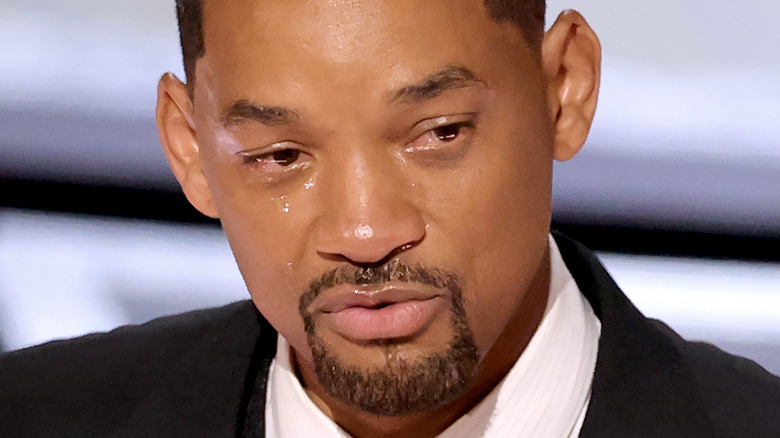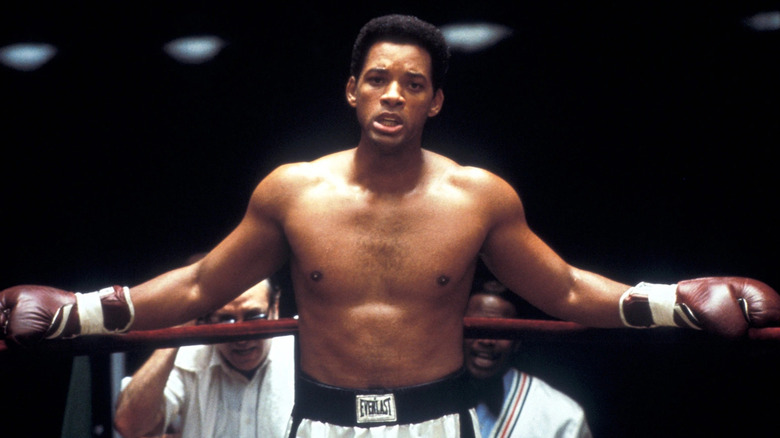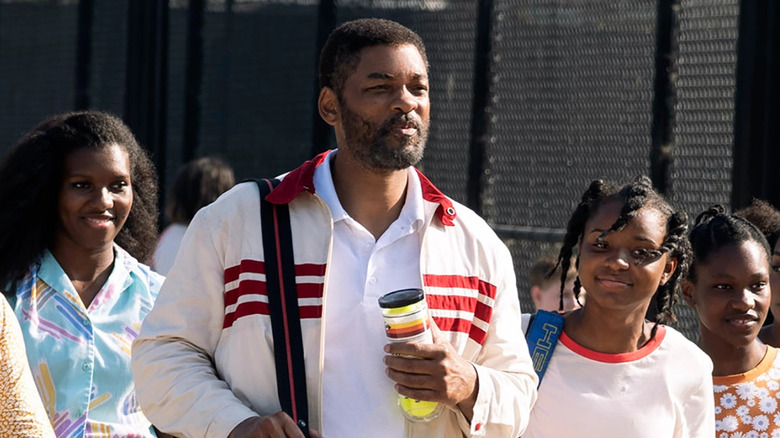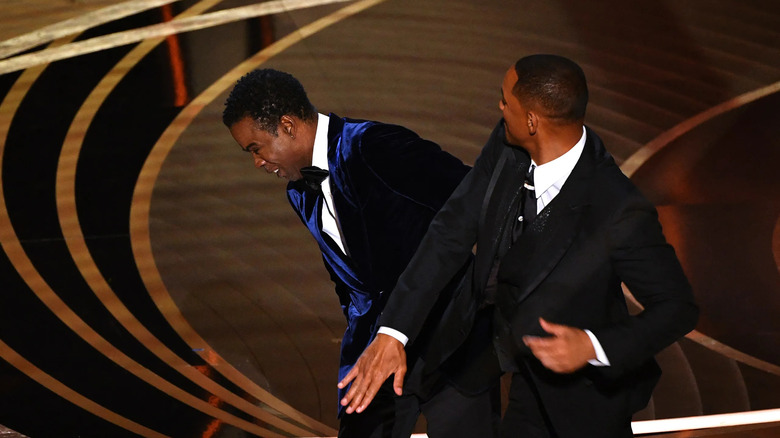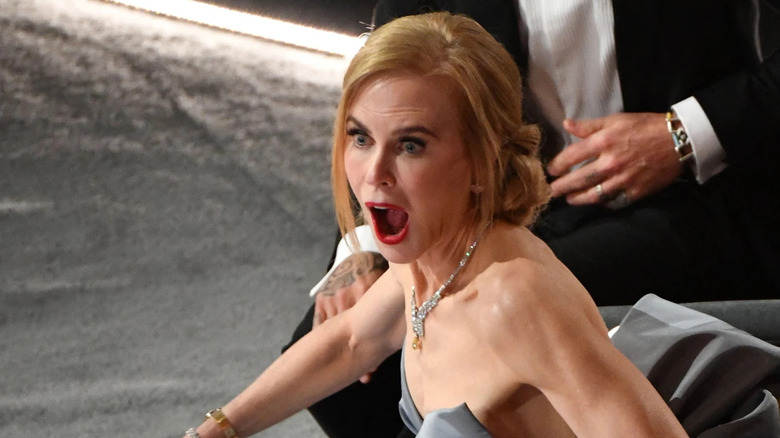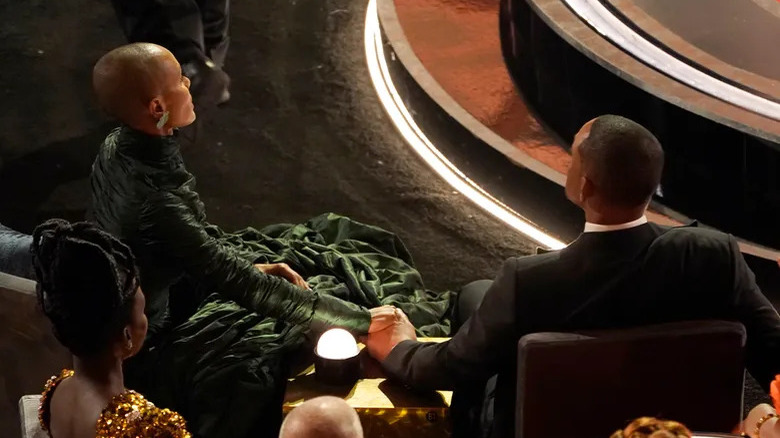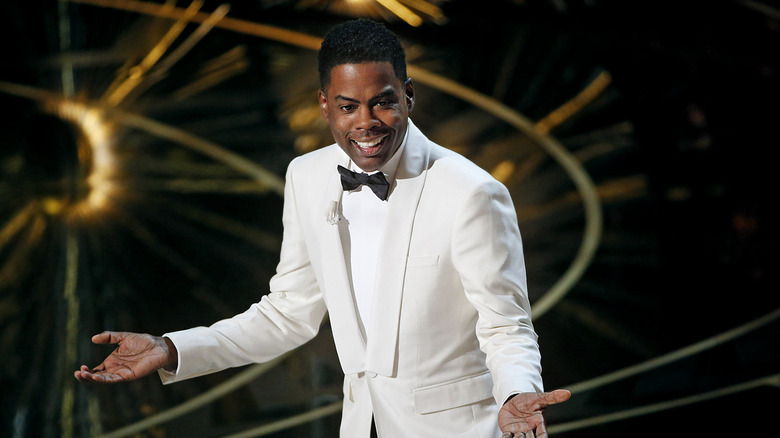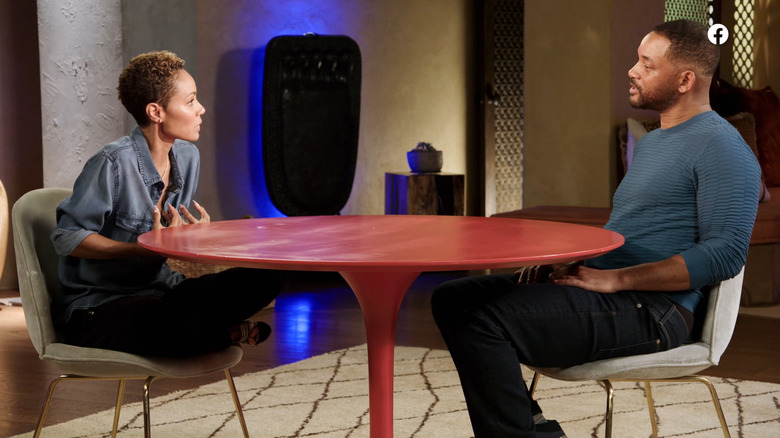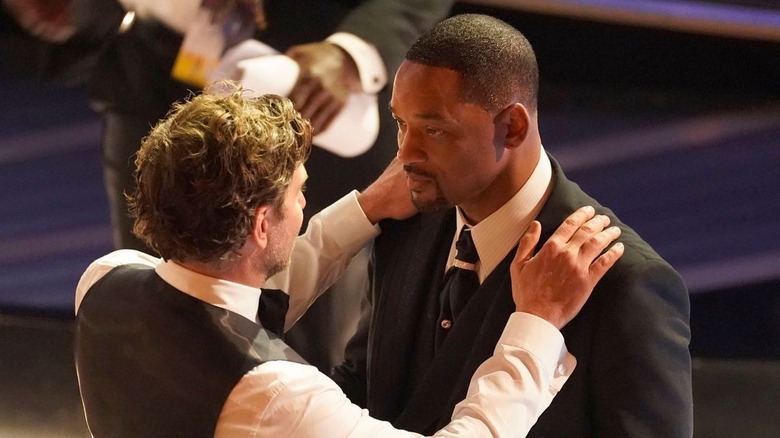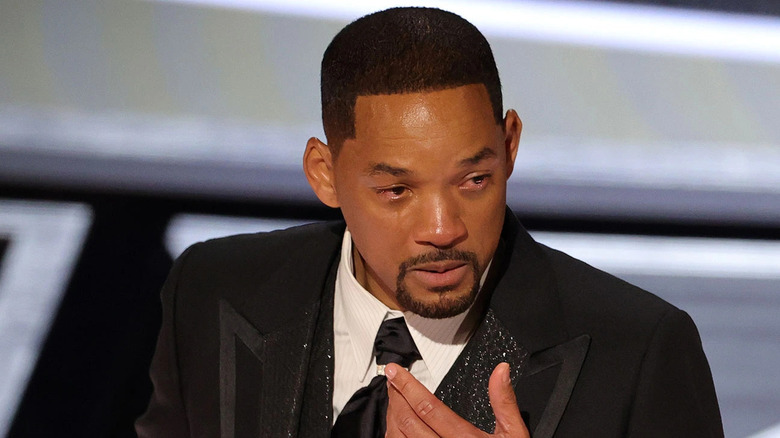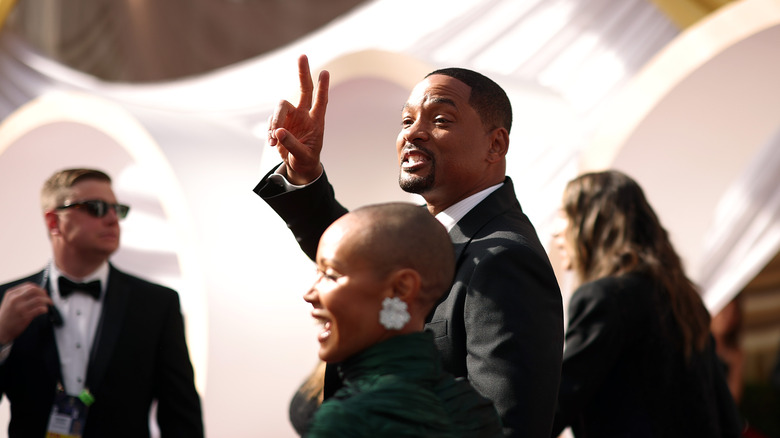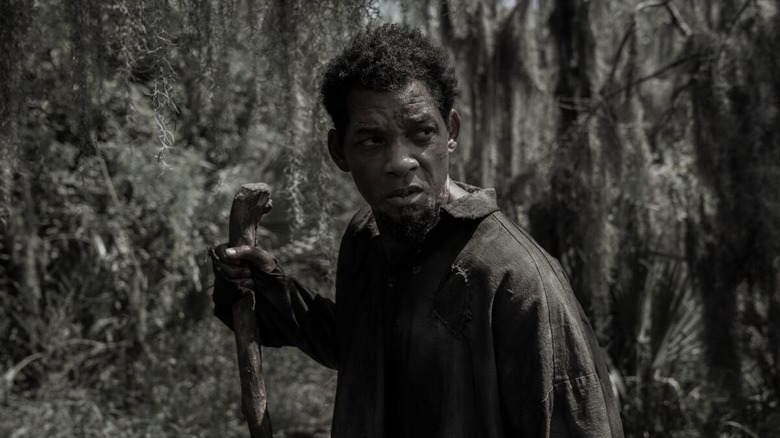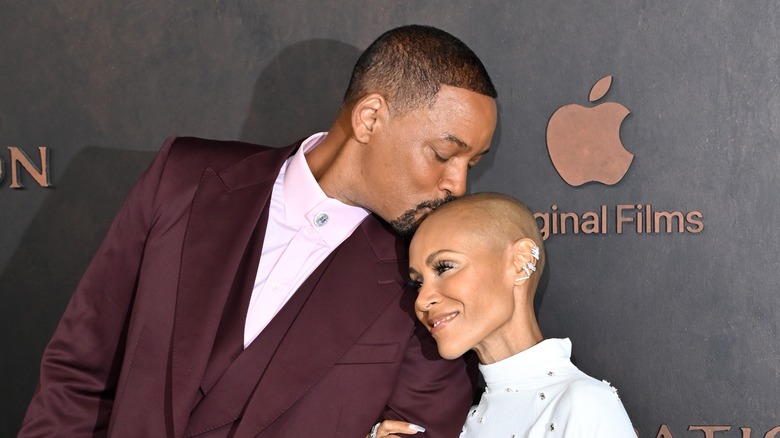The Entire Will Smith Oscars Slap Controversy Explained
For years, the Academy Awards have faced declining ratings, due in part to streaming becoming more popular than broadcast television, and the fact that the Oscars had been honoring more obscure films than blockbusters as of late. With the exception of "Dune," the 2022 nominees were yet another crop of little-seen movies, and the 94th Academy Awards seemed likely to continue its downward-trending viewership. Then, about halfway through the ceremony on the evening of March 27, something happened that nobody could have predicted.
Those who had been watching the Oscars live texted friends or posted to social media. Ratings spiked (via Variety), but not for the right reasons. The slap — as it came to be known almost instantaneously after it took place — garnered worldwide attention and consumed the media cycle following the Academy Awards in a way that not only eclipsed the winners but most other national and international news stories. Both in person at the Dolby Theater and in front of TVs all over the planet, people couldn't believe their eyes and didn't know what to think.
While the slap became fodder for snide jokes and hot takes, the incident also launched wide-ranging debates about serious issues. The controversy — or at least the attention given to it — may have died down in the 10 months since, but the slap is still a pop cultural and socio-political minefield. This is how Will Smith went from Oscar favorite to Academy persona non grata, and why his actions — and the Academy's reactions — remain so vexing.
Will Smith's history with Oscar
Will Smith first became known for his breakout role as a fictionalized version of himself in the 1990s sitcom, "The Fresh Prince of Bel Air." He earned rave reviews for his film debut in 1993's "Six Degrees of Separation," and quickly ascended to bona fide movie star status with massive hits like 1996's "Independence Day" and 1997's "Men in Black." Smith's charismatic performances in such films require a certain kind of talent, but it's a talent that almost always goes unrecognized by the Academy. After 1999's "Wild Wild West" was a critical and box office disappointment, Smith transitioned to more serious acting with his titular role in Michael Mann's 2001 biopic, "Ali."
Playing the legendary boxer earned Smith his first Oscar nomination, but he lost to Denzel Washington for "Training Day." Over the next two decades, the actor-rapper-producer's career would volley back and forth between what he hoped would be critical favorites and more commercial fare. He received his second Oscar nomination for his lead performance as a struggling single father in "The Pursuit of Happyness"; this time, Forest Whitaker won for "The Last King of Scotland." In 2015, Smith starred in "Concussion" as the doctor who discovered chronic traumatic encephalopathy (CTE) in football players. He didn't make the 2016 best actor cut, but he and his wife, Jada Pinkett Smith, insisted their boycott (via Variety) of the event had only to do with the lack of diversity in that year's nominees. Still, Smith was widely seen as wanting to win one of those little gold men one day.
Frontrunner status
Will Smith's best Oscar chance came with 2021's "King Richard," a film he co-produced about the father of the tennis-playing Williams sisters. "King Richard" was almost universally liked by critics and audiences in a relatively weak year for movies, only about 18 months removed from the start of the COVID-19 pandemic. The film and its star collected just about every accolade that they could leading up to the Oscars.
Awards are usually something of a horse race, with a campaign season not unlike that of an election. Actors in particular have to walk a fine line between being available to press and Academy members and being overexposed. Smith handled the lead-up to the Academy Awards perfectly. He was charming in interviews. He used his acceptance speeches to heap praise on his collaborators, co-stars, and the Williams family. He won every major precursor to the Oscars, including the BAFTA, SAG, Golden Globe, and multiple critics' prizes. "King Richard" went on to be nominated for six Academy Awards, including best actor, and by March, Smith was the prohibitive frontrunner.
Winning an Oscar is never a sure thing, even for those at the top of the betting odds, but Smith was about as dominant as any best actor candidate had ever been. That night at the Dolby Theatre, his victory was practically (via Gold Derby) a foregone conclusion.
The slap
With only about an hour to go before his dream of winning an Oscar seemed all but guaranteed to come true, Will Smith did something that he'll surely regret for the rest of his life. Chris Rock took the stage to present the award for best documentary feature. Presenters usually have some brief pre-written material to deliver before they list the nominees. Rock started by teasing husband and wife Javier Bardem and Penélope Cruz, who were both nominated for lead actor and actress respectively. Then the stand-up comedian went off-script and turned his attention to Will and Jada Pinkett Smith, who sat in the front row near the center. The offending punchline was, "Jada, I love ya. 'G.I Jane 2,' can't wait to see it."
Smith appeared to laugh at first, as if being a good sport about it. His wife rolled her eyes, to which Rock responded, "That was a nice one," in defense of the joke. A moment later, Smith stood, walked onstage toward Rock, and slapped him with his open right hand across the face. Smith returned to his seat, where he looked decidedly more upset than he'd been only a few seconds before, and shouted, "Keep my wife's name out of your f***ing mouth." Rock, who'd said "Uh-oh" as Smith approached him, took a beat to compose himself, then said into the cameras, "That was, uh, greatest night in the history of television."
Confusion in the room and on TV
Because awards shows frequently feature celebrity skits and stunts, people in the room as well as people watching on TV couldn't tell whether the slap was a clumsily executed attempt at comedy or a real altercation between Will Smith and Chris Rock. Some in-person attendees initially assumed it had all been planned (judging from the awkward laughter followed by an awkward hush), as did plenty of viewers at home. But those seated nearby Will and Jada, like Lupita Nyong'o and Beyonce, seemed to realize what was happening in real time (via The ABC).
Oscar watchers at home got their first clue that the slap was real when the audio cut out during the American broadcast. ABC airs live programs in the United States on a 20-second delay, which isn't in place for global audiences. Had the tense exchange been a bit, the network wouldn't have taken this step. Regardless, clips from around the world quickly made their way to the internet and were shared en masse.
In the uncensored version, Rock's shock is apparent in the way he says, "Will Smith smacked the s*** out of me." Despite the deeply uncomfortable tension in the Dolby Theater, Rock still had to award the Oscar for best documentary to Questlove for his film "Summer of Soul," in front of a still-confused crowd. Questlove later told Jimmy Fallon (via Billboard) that he was meditating during the announcement of his category and wasn't aware of what had occurred between his friends, Smith and Rock.
Chris Rock's joke didn't land
While Will Smith's behavior was inexcusable, Chris Rock's joke was also excoriated — especially online — in the immediate aftermath of the slap. Some commenters merely pointed out that the quip wasn't very funny. It was, at best, a lame observation and a reference to a nearly 25-year-old movie. But the majority of those discussing the "G.I. Jane" line and the slap brought up Jada Pinkett Smith's alopecia diagnosis.
The actress went public with her condition in 2018 via an Instagram post. She explained that she chose to shave her head when patches of her hair began to fall out because she didn't want anyone to think that she had undergone something relatively more serious, such as brain surgery. Pinkett Smith said dealing with and talking about the medical condition was difficult, but she remained in good spirits, telling her fans, "Me and this alopecia are going to be friends." The post was viewed more than two million times, and Pinkett Smith's alopecia was fairly common knowledge by 2022.
In the days after the ceremony, Rock's brother claimed to the Los Angeles Times that the comedian wasn't aware of Pinkett Smith's diagnosis and wouldn't have gone there, had he known about her struggles with hair loss.
The relationship between the Smiths and Chris Rock
Hollywood's a small world. According to Newsweek, the Smiths and Chris Rock had a decades-old personal and working relationship prior to the slap. In 1995, Rock guest-starred on "The Fresh Prince of Bel Air," where he and Will Smith became friends. Jada Pinkett Smith and Rock both voiced characters in the animated "Madagascar" films. Over the years, Rock has expressed admiration for the Smiths and their children. But the good will turned sour in 2016 when Rock first used the Oscar stage to mock the couple (via Newsweek).
Rock was asked to host the 2016 Oscars in the wake of the 2015 #OscarsSoWhite controversy (via USA Today), when none of the 20 nominees in the acting categories were people of color. When it happened again in 2016, a number of prominent Black filmmakers boycotted the ceremony, including the Smiths. Pundits thought (per Vox) that Smith had an outside shot at a nod for his role in "Concussion," but Idris Elba for "Beasts of No Nation" and Michael B. Jordan for "Creed" were thought to be the bigger snubs.
Rock poked fun at Will's dashed Oscar hopes and at Jada's #OscarsSoWhite protest with one of his monologues during the proceedings. Of Will, he said, "It's not fair that Will was this good and didn't get nominated. It's also not fair that Will was paid $20 million for 'Wild Wild West!'" He took aim at Jada's celebrity (or lack thereof) with the following analogy: "Jada boycotting the Oscars is like me boycotting Rihanna's panties. I wasn't invited."
Will and Jada under scrutiny
The discourse around the slap extended far beyond #OscarsSoWhite and alopecia jokes. The incident became a window through which the public could view Will and Jada Pinkett Smith's complicated 25-plus-year marriage (via Cosmopolitan), which had long been the subject of internet rumors and tabloid speculation.
Though they've been married since 1997, Jada has occasionally expressed some provocative opinions about the very concept of marriage, which may have led to the public perception that she was less than content. Eventually, gossip began to spread that Jada had engaged in an affair with singer Marc Anthony and that the Smiths had an open relationship. The couple has repeatedly issued denials about such whispers, but chatter about divorce and Jada's presumed distaste for monogamy continued to plague the Smiths.
Things reached a fever pitch in 2020 when singer August Alsina asserted that Will had given him his blessing to date his wife. Though Jada's camp again denied the story, she and Will aired their marital problems with more specificity during an episode of her Facebook Watch show, "Red Table Talk." Jada admitted that she had been in a relationship with Alsina while she and Smith were in the midst of a trial separation. Will went into more detail about their ups and downs in his 2021 memoir. The Smiths remain together, but their reactions to Chris Rock's joke at the 94th Oscars — particularly Will's about-face from laughter to anger — were scrutinized through the lens of the intrigue surrounding their love life.
The reaction was polarized
Only seconds after the slap, the entertainment industry and the public at large sorted into two sides: one that defended Chris Rock's joke and one that defended Will Smith's anger. In the room, Smith was calmed down (via Today) by the likes of Bradley Cooper, Denzel Washington, and Tyler Perry. Elsewhere in the audience, attendees — including Serena Williams — sat stunned. But, while some celebrities (per Esquire) like LaKeith Stanfield, Queen Latifah, and Minnie Driver expressed empathy for all parties involved, many threw their support behind either Smith or Rock.
Judd Apatow, Amy Schumer, Mark Hamill, Stephen Colbert, Kathy Griffin, Zoe Kravitz, Mia Farrow, O.J. Simpson (believe it or not), and many more were appalled that Smith resorted to violence and/or worried about the precedent that Smith may have set for audience members attacking comedians. To be fair, their reactions to the slap varied from reasonable to overblown (via Insider). Tiffany Haddish, Nicki Minaj, Sophia Bush, and the actor's son Jaden, among others, either sympathized for Will or criticized Rock for his insensitive one-liner.
Among non-famous users of social media, opinion seemed to be split down the middle. What people thought of the slap even became a Rorschach test (per Rolling Stone) for their supposed left-or-right-leaning politics. In the aftermath, countless think pieces would be written about how the slap related to race, toxic masculinity, mental health, and myriad other topics. The incident was far too thorny for anyone to fully figure out, but that didn't stop practically everyone from having a take.
Smith won, as expected
Will Smith seemed to understand immediately that he'd forever tarnished what was supposed to be his big night. Sure enough, as Smith accepted his best actor statue about 40 minutes later, the shared anxiety and secondhand embarrassment in the Dolby Theater was palpable. Still, somewhat unexpectedly, Smith received a standing ovation (via Newsweek) from most of those in attendance, which didn't sit well with some in the room and some watching from home. On one hand, Smith was well-liked among his peers and seen as deserving of the award, not only for his performance in "King Richard" but for his 30-year career. On the other hand, he'd just done something that might have easily resulted in criminal charges for a non-famous person, and it seemed wrong to congratulate him under the circumstances.
Had Smith's speech been short and sweet, the slap may not have become such a lasting talking point. Instead, the tearful actor used his soapbox to make some questionable comparisons between his assault on Chris Rock and Richard Williams' parenting style, positioning his actions as born out of love for his family (per Vanity Fair). But his tone-deaf words were seen as problematic (via CNN): they reminded many domestic violence survivors of the language their abusers used to repackage their emotional and physical abuse as love. Smith also spoke for more than five minutes, well beyond the time allotted for most winners to deliver their remarks. As he rambled, his fans worried that he wasn't okay and needed help.
If you or someone you know is dealing with domestic abuse, you can call the National Domestic Violence Hotline at 1−800−799−7233. You can also find more information, resources, and support at their website.
The show's producers didn't know how to handle the situation
Anything can happen on live TV, and producers need to be prepared. But the slap was a far more fraught situation than even the best picture mix-up of 2017, when "La La Land" was mistakenly announced as the winner instead of "Moonlight." As soon as the producers realized that the slap was genuine, they decided (per Variety) to go forward with the broadcast, especially once Cooper, Washington, and Perry had appeared to get a remorseful and humiliated Smith under control. The night's other honorees also factored into that calculus. The organization tweeted a short, prepared statement (via CNN) reading, "The Academy does not condone violence of any form. Tonight we are delighted to celebrate our 94th Academy Awards winners, who deserve this moment of recognition from their peers and movie lovers around the world."
The team responsible for the show was largely left out of discussions within the Academy as to how to handle Smith's outburst. According to the Hollywood Reporter, it wasn't clear whether Smith was asked to leave and refused or whether the Academy had either allowed or even asked him to stay. That Smith was the likely best actor winner and that Rock chose not to press charges complicated the debate. Ultimately, both the Academy and Smith opted to deal with the fallout after the telecast ended. With more time to reflect (though he lived it up at an afterparty first, via EW), Smith issued a formal apology to Rock, and the Academy announced it would be launching a review of Smith's conduct.
Consequences came after the fact
With the ceremony in the rearview mirror, the Academy weighed its options and Oscar viewers wondered whether Will Smith would have to return his award. Smith preemptively resigned from the Academy of Motion Picture Arts and Sciences and, weeks later, the organization announced that Smith would be banned from the Oscars ceremony and any other related A.M.P.A.S. events for 10 years. His punishment did not, however, exclude him from being nominated for future awards. Smith released a statement saying that he accepted and respected the decision.
The consequences doled out by the Academy have proven to be as hotly debated as the slap itself. Some think the Oscars went too easy on Smith and argued that the relatively light restrictions were in keeping with the organization's tendency to sweep problems under the rug. Others felt the penalty was too harsh (via the Los Angeles Times), especially when compared to the Oscars' permissive attitude toward much more severe (and white) alleged offenders like Harvey Weinstein, Woody Allen, and Roman Polanski.
Smith happened to have what seemed like an Oscar bait-y movie in the can with Antoine Fuqua's "Emancipation," a gritty period piece inspired by an iconic Civil War era photograph of a whipped slave. Apple TV+, which bought the rights to the film, released it on the streaming service in time for awards consideration, but its middling reviews kept it out of the race, and kept Smith and Oscar at arms' length for now.
Where things stand now
The slap was the type of pop cultural event that will continue to reverberate into the futures of both the Smiths and the Oscars. Time will tell if the 95th Academy Awards will address it. For his part, Will Smith has tried to make amends and move on. He put out a YouTube video in July 2022 outlining his progress. In the clip, Smith apologized to Rock and his family as well as Jada and his own family, plus his fellow 2022 nominees, saying, "It really breaks my heart to have stolen and tarnished your moment." The actor described his demeanor that night as unacceptable and said that he wants to accept responsibility and deal with his emotions in a healthier way. Smith added that he had reached out to Rock, but that Rock wasn't ready to talk yet.
The embattled A-lister also admitted that he understood if moviegoers weren't ready yet to see him as a leading man again. During his press tour for "Emancipation," he spoke to former "The Daily Show" host Trevor Noah about the slap and acknowledged he created a mess for himself. Smith does have upcoming projects in the works, primarily as a producer, and a potential "Bad Boys 4" is still up in the air. Though his star may eventually rise again, Will Smith's name and reputation will forever be associated with the unfortunate episode that marked one of the best and worst days of his life.
